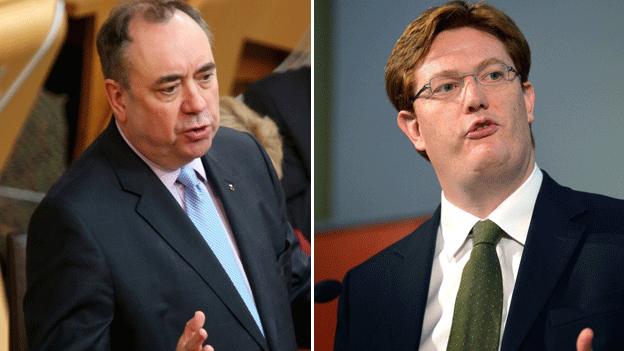Two assessments of Scotland's future
- Published

Alex Salmond and Danny Alexander presented rival assessments of how Scotland would fare if independent
It's about spending, it's about taxation, it's about people, it's about politics, it's about propaganda, it's about claim and counter-claim, it's about oil.
On the same day we had not one but two documentary assessments of the economic future of Scotland under independence.
Danny Alexander set out Treasury thinking at a briefing in an Edinburgh hotel, watched by civil servants, special advisers, sundry economists and the wicked media.
A few yards up the hill, Alex Salmond offered Scottish government analysis.
Mr Alexander appeared to believe that the Scottish government effort was a spoiler. Not so, said Mr Salmond.
You will find the substance elsewhere on these pages. Perhaps it might be pertinent though to draw attention to one or two facets.
'Start-up costs'
Firstly, the prelude.
The Treasury scarcely helped its case by highlighting an estimate of the start-up costs for independence which was predicated upon an academic study by the LSE.
That resulted in a high figure being promulgated. The LSE academic cited said his analysis had been "badly misrepresented".
According to Scottish ministers like John Swinney, that controversy "completely undermined" the Treasury case, casting doubt upon the entire exercise.
Treasury Ministers stressed their final, published report did not use that figure - and, in any case, start-up costs were but a tiny proportion of the overall bill which independence would involve (some £4, they say, out of the total "Union dividend" of £1400).
Further, critics of the Scottish government position noted that Mr Swinney repeatedly declined to offer his own estimate of start-up costs when interviewed on the wireless (BBC Radio Scotland, naturally).
Mr Swinney said there would be a range of factors in play, including the negotiations over assets with the remainder of the UK.
Mr Salmond said that the traduced academic, Professor Dunleavy, had produced a figure of around £250m in start-up costs. He broadly agreed.
Treasury ministers said that was risibly low.
'Stasis versus growth'
To other matters.
Consider the different nature of the approach by the two governments. You could characterise this as stasis versus growth.
The Treasury took the current position in which, they said, Scottish spending is roughly one thousand pounds per head higher than elsewhere in the UK.
Under independence, that cost would fall solely upon Scotland.
Add to that, they said, a disproportionately ageing population, declining oil revenues linked to over-ambitious Scottish government estimates of return, those start-up costs - and you have a bill totalling £1400 for every person in Scotland to fund independence.
Intriguingly, the Treasury turns that round into a "dividend" under the Union: a positive depiction.
It would appear that strategists have heard the message that negative campaigning - or what can be depicted as negative campaigning - can be counter-productive.
Barnett formula
Question: if the bulk of that dividend is predicated upon higher spending, via the Barnett formula, does that amount to a guarantee that said spending lead will continue?
I reminded Mr Alexander that his party had gained coalition power in Westminster on the basis of a manifesto which promised a needs-based distribution of spending.
He said that had been overtaken and no political party was now contemplating the removal of Barnett.
Then the growth scenario.
Mr Salmond says that, over fifteen years, Scotland could accumulate a £5bn "independence bonus" - some £1000 per person.
Question: say the growth fails to materialise or falls short. What happens to the bonus?
Mr Salmond said that small countries with economic levers had proven remarkably adept at generating growth.
Nevertheless, there is uncertainty inherent in each offer. No surprise given that our recipe here is economic forecasting blended with political machination.
Tax receipts
Finally, oil.
The Scottish government has now downgraded its projections of North Sea tax receipts.
They use various scenarios but, taking the one they highlighted a year ago, the figure for 2016/17 - the putative year of independence - is down from £7.9bn to £6.9bn.
In an analysis of the contest today, the Institute for Fiscal Studies points out the difference between even this revised figure and the £2.9bn used by the Office for Budget Responsibility.
That, say the IFS, is the crucial gap between the Treasury and the Scottish government.
Mr Salmond's critics tend to point to the OBR statistic, as quoted by the IFS. Mr Salmond says they have routinely under-estimated the oil price.
A significant day. Not decisive either way. Not final, by any means.
But much of the remainder of this prolonged exercise in public persuasion will be founded upon the competing visions of independence offered today.